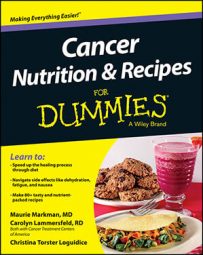Nausea and vomiting aren’t the only stomach issues caused by cancer treatments. You may also develop indigestion, heartburn, and even gas. If you’re experiencing such effects, in addition to taking any medication as prescribed, the following changes to your diet and lifestyle can help manage these symptoms and prevent pain or discomfort:
Avoid irritants to prevent heartburn. Irritants will make heartburn symptoms worse. Tobacco and alcohol are the worst offenders; caffeine is also high on the list. Certain foods should also be avoided, including acidic ones like tomato products and citrus products, because they can cause heartburn. Other foods may make it easier for acid to “back up” from your stomach into your esophagus; avoid chocolate and mint for these reasons.
Reduce gas by limiting or avoiding gas-forming foods. Many normally desirable foods, including high-fiber fruits and vegetables, can cause gas and pain. Raw salads, raw vegetables, the cabbage family of vegetables, and beans may cause more gas to be produced in your digestive tract.
Because these foods are healthy, try adding them back into your diet one at a time when you feel better. Other gas-forming foods to avoid include carbonated beverages and chewing gum. Also, avoid sipping any beverages with straws.
Limit or avoid high-fat foods to prevent heartburn. Fatty foods take longer to leave your stomach than other foods, which can cause heartburn. Stay away from fried foods, doughnuts and pastries, fatty meats, and full-fat dairy products.
Limit or avoid sugar alcohols to prevent gas and bloating. Sugar alcohols, including sorbitol, mannitol, xylitol, and maltitol, are used to sweeten foods as an alternative to sugar. These sweeteners can contribute to bloating and stomach discomfort.
Elevate the head of your bed and don’t lie down right after eating to prevent heartburn. This tip relates to the simple rule of gravity. By elevating the head of your bed and avoiding reclining after eating, it’s harder for acid to back up into your esophagus and cause heartburn.
Ask your doctor about over-the-counter remedies. Over-the-counter antacids like Tums or Rolaids may be helpful for heartburn. These contain calcium, which helps neutralize stomach acid. Like any other nutrient, too much calcium can be harmful, so you shouldn’t use more than the recommended dosage.
Another potentially beneficial over-the-counter drug is Gas-X, which contains simethicone, a gas-reducing agent. Also, Beano (an enzyme-based dietary supplement) may help when eating gas-forming foods. Again, even though these products don’t require a prescription, you should use them only under medical supervision to reduce the risk of introducing new side effects from a drug interaction.

